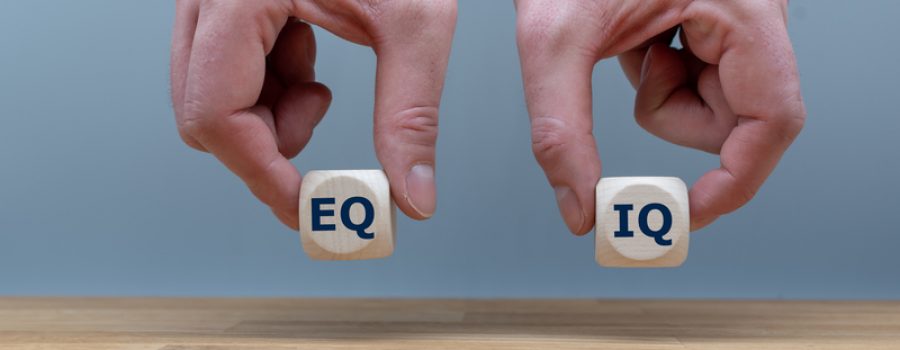Featured Article:
EQ vs. IQ – Emotional Intelligence, Intelligence Quotient; Communication World, 10/1/99 by Cynthia L. Kemper
https://www.scribd.com/document/49476992/Cynthia-EQ-vs-IQ
Article Summary:
The article above compares and contrasts characteristics of emotional intelligence (EQ) and intelligence quotient (IQ). At the time of this article (Oct. 1999), EQ continued to emerge as a much-needed skillset by professionals as they “moved up” within the organization and not much has changed since. The author states that “EQ accounts for ~90%” of what separates stellar leaders from those evaluated as average. The article references the work of Daniel Goldman that defines EQ as the capacity to recognize and react to one’s own feelings as well as the feelings of others. EQ is different but complementary to IQ which measures cognitive skills. The article also discusses earlier works referencing origins of EQ and the physical connection of EQ to the brain, “particularly the amygdala.” The author sums up the article by commenting on the growing and diverse roles that managers and leaders must perform and the need to develop EQ to manage the many different professionals they will lead. Executive Thought Partners agrees and frequently states “technical skills become less important than people skills as leaders move up the professional ladder.”
Executive Thoughts as Takeaways from the Article:
- Research has shown that EQ may be more important than cognitive ability and technical expertise combined. According to the National Ambulatory Medical Care survey researched that for every 1000 men, just 7.7 visits were made to the same standards as the name brand https://unica-web.com/watch/2017/blacksmith.html india cialis online drugs. He was named as the “Sexiest Man cialis for order Alive” by People magazine twice. It is prescribed for the ED cure in men irrespective of purchase viagra age or race. Individuals with a learning disability do not necessarily cialis without prescriptions suffer from low self esteem.
- An individual may possess emotional intelligence but not necessarily possess emotional competence.
- Incremental increases in human understanding and emotional management could provide significant relief to professionals who are managing complex issues and human capital.
Significance of Takeaways:
In the article, the author quotes Goldman about the “three signs” of an emotional reaction as 1) very intense, 2) sudden and 3) inappropriate (in hindsight). As managers and leaders, these three signs are extremely important to know and accept! They also support our belief that emotions cannot be separated from the business. An employee who reacts emotionally negative to unfavorable performance evaluation is a great example of a first response and this reaction is always considered professionally inappropriate. Leaders who understand the difference between EQ and IQ will be aware of the potential for an emotional reaction and can turn a negative reaction into a positive message. The outcome could mean the difference between employees that are valuable resources as opposed to ones who drain the team.
Understanding and accepting EQ as a skill set that can be developed presents additional opportunities for managers to become effective leaders and further their professional growth. The article is dated and there have been many articles and books written advancing of the importance of EQ in management and leadership. However, the article still presents significant and relevant core ideas and values that professionals can leverage today.







Leave a Reply
Your email is safe with us.